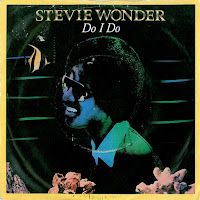— Fred Dellar
With Single of the Fortnight having been established in the middle of 1981, it's notable that the late Fred Dellar seemed to opt out in what would turn out to be his final singles review go in Smash Hits. Nothing thrilled him enough to give a record similar treatment to The Jam's "Absolute Beginners", Stevie Wonder's "Do I Do" and Kim Wilde's "Child Come Away". Held up against those three, I can't say I blame him. There are a handful of good records present but almost nothing I feel like I need to ever hear again.
Among them is Michael Jackson's "Billie Jean" which Dellar forces into a shared review with baby sister Janet's "Come Give Your Love to Me". While he admits that the former is a grower he is far less impressed by the younger Jackson's "effort". (Surprisingly, this dismissal of the global smash from the blockbuster Thriller album wasn't included in the early '85 Hits feature Our Most Embarrassing Singles Reviews, though Dave Rimmer's even less enthusiastic assessment of follow-up single "Beat It" did make the cut) While it may seem to beggar belief that such a pop classic could be shrugged aside, under the circumstances I can understand such a move: the sheer thrill of "Don't Stop Til You Get Enough" could render anything that follows it just a tad disappointing.
In truth, there are just a pair of numbers that Dellar seems to have any affection for. One of the is "Cath" by Scots The Bluebells, while the other is the second single from The Nightfly, the debut album from former Steely Dan co-leader Donald Fagen. Since his enthusiasm for the former doesn't quite match that of the latter, "New Frontier" takes the proto-SOTF "honours". How nice that these are precisely the same pair of singles that I'm fond of as well.
As I suggested before the last time this record came up three years ago, much of what is on The Nightfly is autobiographical. This isn't information I sought out in any particular way, I merely looked it up on Wikipedia and it presented itself to me. Sorry but that's as much due diligence as I was willing to put in. Perhaps had I persisted with more than just the first bit of Fagen's autobiography Eminent Hipsters I could've found out more but I only had the audiobook to rely upon. Much as I dig Fagen as a vocalist — even if he isn't much of a singer per se — his Long Island deadpan is not the sort of sound I can tolerate for long. "Read by the Author" may be an enticement when you're dealing with Alan Bennett or Stephen Fry but it acts as more of a warning when you've got Donald Fagen narrating.
Back to the autobiography: I'm not sure it matters. While I misinterpreted my initial reading of "New Frontier" by thinking that it's about a young man using his family's little-used fallout shelter as a pathetic nightclub, this is actually a perfectly good narrative with which to base a Steely Dan song around. More to the point, whether Fagen himself tried to lure girls from school into the family bomb shelter or he just invented such a scenario isn't especially important to us as listeners. I imagine the memory of this means something to him but for me it only goes to show just how much of a Dan-type character he has always been. If "New Frontier" is indeed extracted from his life then why not "My Old School" or "Barrytown" or "Deacon Blues" as well?
And, indeed, why not a whole lot more while we're at it? Let's be honest here: "New Frontier" sounds like a Steely Dan song: there's Fagen's faintly desperate-sounding voice, those familiar backing vocals, that trademark exactitude in the musicianship. With all due respect to the late Walter Becker, would anyone have noticed that he's not on it? Had there been an eighth Dan album it would've sounded not unlike The Nightfly. Come to think of it, there was an eighth Dan album! 2000's comeback Two Against Nature routinely gets slammed because it won a Grammy that it allegedly didn't deserve (though to be fair, voters undoubtedly didn't see the point of listening to Kid A more than the once and couldn't understand that the genius of The Marshall Mathers LP was that every song was meant to sound the same) but it's a worthy effort all the same. That said, it's no Nightfly. Few things beyond prime Steely Dan are.
~~~~~
Also Reviewed This Fortnight
Virginia Astley: "Love's a Lonely Place to Be"
Listen to a Virginia Astley single and it's too much; listen to a Virginia Astley album and it's not enough. Dellar isn't crazy about this piece of "pretty-pretties" and I know what he means. Three or four minutes just doesn't do her sound justice. It isn't that her work requires patience or persistence or hard work, it's just that a good deal of it needs to spread itself all over the listener in order for them to appreciate it. Either that or she was just too good and too important for singles even if this didn't stop her from releasing them. All I know is I've liked what I've heard from her, limited though it may be, but "Love's a Lonely Place to Be" just passed me by, like a dewy cherry blossom pedal that fell to the ground just as I looked the other way. Or something to that effect.
(Click here to see my original review)












